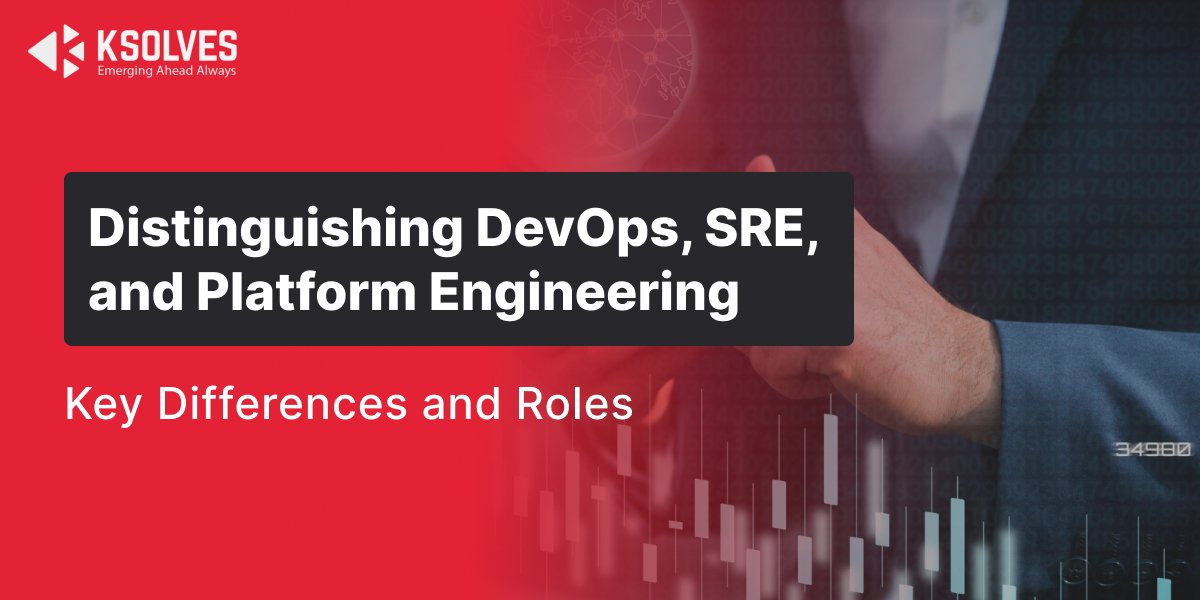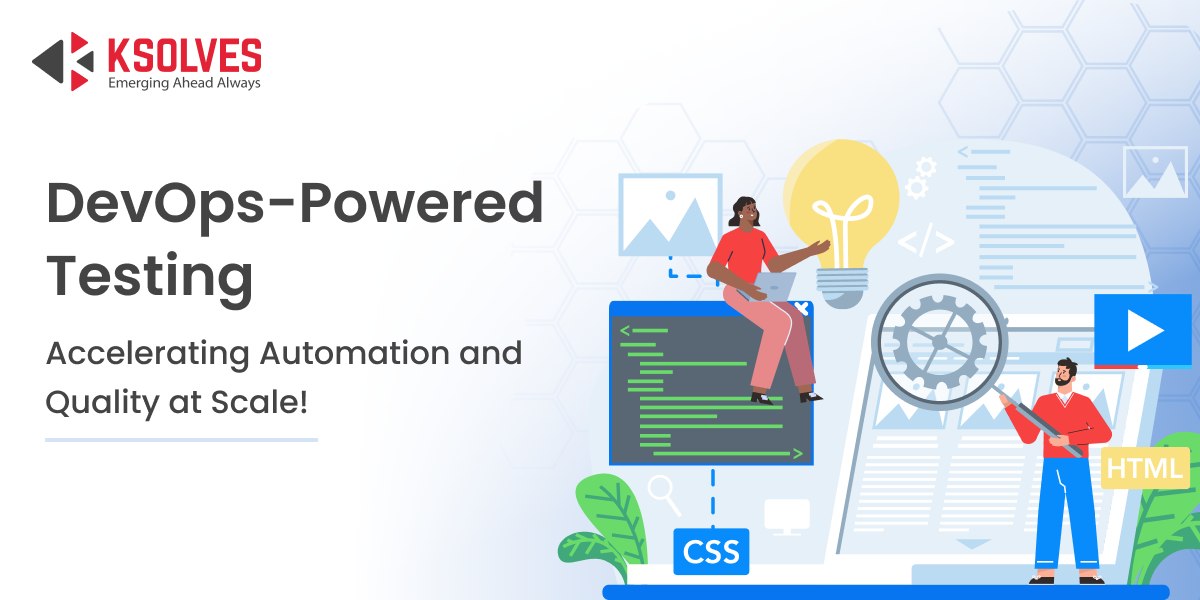Distinguishing DevOps, SRE, and Platform Engineering: Key Differences and Roles
DevOps
5 MIN READ
June 28, 2024
![]()

Have you ever wondered how Netflix delivers your favorite show seamlessly and how Amazon consistently rolls out new features?
In this tech-dominating world, there are some major concepts of software that have been transforming the modern digital world. These transformative methodologies are Site Reliability Engineering (SRE), DevOps, and Platform Engineering.
Each technique has its own guiding principles, benefits, and potential drawbacks, highlighting the diverse strategies available to companies aiming to enhance operational efficiency and navigate the dynamic landscape of modern IT. This variety allows organizations to choose the most suitable approach to meet their specific needs and challenges.
Understanding DevOps for Enterprises
Software development comprises two different departments. The development team develops the plan and builds the system from scratch. The other department is the operations team for testing and implementation of the software developed.
The operations team gives feedback to the development team on any bugs that need to be fixed and any rework required. As the operations team provided input, the development team would be idle. Undoubtedly, this resulted in prolonged timescales and a delayed development process overall.
To overcome these challenges, the two departments came together and worked in collaboration with each other. This approach was called DevOps. It has an infinity sign, which defines that it is a continuous process of improvement, efficiency, and constant activity.
The DevOps approach makes companies adapt faster to updates and development changes. The teams can now deliver quickly, and deployments are consistent and smooth. It manages a streamlined flow between the teams and makes the software development process successful.
Also Read – Right DevOps Tools: A Comprehensive Guide for Development Teams
Phases of DevOps Implementation
Plan: The first phase is the planning phase, where the development teams put down a plan keeping in mind the application objective that has to be delivered to the customer.
Code: Once the planning is done, coding begins. The development teams work on the same code and different versions of the code that are stored in a repository. With the help of tools, they get merged when required. The process is called version control.
Build: The code is then made executable with tools like Maven and Gradle in the build stage.
Test: After the code is successfully built, it is then tested for any bugs or errors. The most popular tool for automation testing is Selenium.
Deployment: Once the code has passed several manual and automated tests, it is ready for deployment. The operations team then deploys the code into the working environment. This phase involves using prominent tools such as Ansible, Docker, and Kubernetes to automate and streamline the deployment process.
Monitor: After the deployment, the product is continuously monitored and Nagios is one of the best tools to automate this phase.
Integrate: The feedback received from this phase is sent back to the planning phase and this is what forms the core of the DevOps lifecycle. This is called the integration phase. Jenkins is the tool that sends the code for building and testing. If the code passes the test, it is sent to deployment and this is referred to as continuous integration.
What is SRE?
SRE stands for sites or systems reliability engineering and is a discipline that focuses on improving the reliability and performance of software systems. It combines principles from software engineering and system administration to ensure that software systems are available and functioning at all times.
Google implemented Site Reliability Engineering (SRE) in 2003 in response to the difficulties in overseeing its intricate and expansive software systems. SRE dramatically enhances the customer experience, teamwork, and productivity. SRE teams are responsible for:
1. Application monitoring
2. Emergency response
3. Change management
4. Ensuring the availability, efficiency, and performance of applications
Throughout the application lifecycle, these teams collaborate closely with development teams to provide solutions for system-related problems, including automated tasks and software pipeline flaws. They also aid in automating repetitive chores to increase the efficiency of developers.
Also Read – 8 Compelling Business Benefits Of DevOps Strategy
Overview of Platform Engineering
Platform engineering is the art of combining all the different technologies and tools floating around the delivery setup into clear golden paths that enable developers to do self-service and reduce the cognitive load on individual contributors.
The sum of this golden path is most often referred to as the Internal Developer Platform (IDP). The IDP is built by a platform engineering team that follows the “platform as a product” approach. This means that the platform team needs to treat developers as their only internal customers.
Platform engineers and their teams focus on developing version control systems, and automated testing frameworks, among other necessary tools and workflows. To enhance the significance of software development and delivery, they also create procedures like alerting, deployment workflows, and continuous integration/continuous deployment (CI/CD).
Their responsibilities include developing toolchains and workflows, ensuring infrastructure security and compliance, managing infrastructure reliability and scalability, and educating developers on best practices and platform usage. Ultimately, the goal of platform engineering is to address issues stemming from poorly adopted Site Reliability Engineering (SRE) and DevOps practices.
DevOps vs SRE vs Platform Engineering
SRE, DevOps, and Platform Engineering share common goals of improving efficiency and reliability, yet they differ in focus, objectives, and methodologies. Organizations often integrate elements from these approaches to craft a strategy customized to their specific needs and goals within the technology landscape.
SRE vs DevOps
SRE and DevOps share the goal of reducing downtime and enhancing software delivery. SRE places more emphasis on improving system reliability through proactive resolution of possible problems, whereas DevOps streamlines the whole software delivery process from development to deployment, striking a balance between speed and reliability.
Differences between SRE and DevOps
SRE is concerned with making software systems high-performing and dependable, which is necessary for companies to offer consistent services to customers.
DevOps promotes cross-functional cooperation by dismantling organizational silos with its more inclusive cultural approach. The overall efficiency of operations is improved when development and operations teams connect their goals with business objectives.
Similarities
Both SRE and DevOps aim to improve software systems’ efficiency and dependability. This boosts customer happiness, enhances the user experience, and fortifies the brand’s reputation.
Businesses must integrate automation into both SRE and DevOps. Errors are decreased, processes are uniform and predictable, and overall service quality is improved through automation.
Comparing DevOps and Platform Engineering
Although they concentrate on separate areas, platform, and DevOps engineers both contribute to the overall software delivery pipeline. The goal of DevOps is to streamline software releases by fostering collaboration and integration between the development and operations teams.
Platform engineering, on the other hand, focuses on creating and maintaining the infrastructure that backs up software applications, giving programmers a reliable and expandable workspace.
Differences
For companies looking to reduce their time to market, DevOps places a strong emphasis on continuous integration and a collaborative culture. Gaining a competitive edge and meeting market demands are made possible by this increased speed and efficiency.
On the other hand, platform engineering is concerned with creating and managing the infrastructure that supports a system. Ensuring scalability and efficiency in the development and deployment of software applications is crucial for enterprises.
Similarities
Platform engineers and DevOps engineers work together to streamline workflows, accelerate time-to-market, and boost agility for businesses by optimizing procedures within the software development lifecycle.
When contrasting Platform Engineers vs DevOps Engineers for businesses, automation is an important factor to consider. Both positions place a strong emphasis on automation, which guarantees reliable process execution, reduces manual error, and improves overall dependability.
SRE vs Platform Engineering
SRE and Platform Engineering both aim to ensure system reliability and performance but differ in focus. SRE addresses the entire system lifecycle, emphasizing failure prevention and minimizing downtime. Platform Engineering concentrates on the infrastructure layer, delivering developers with the tools and services needed to build and operate reliable applications.
Differences
SRE puts performance and dependability first, which is in line with the corporate goal of providing users with a high-performing software environment.
Platform engineering is the process of building scalable and resilient infrastructure, which is essential for companies that want to manage increasing workloads, foster growth, and preserve operational stability.
Similarities
Both platform engineering and SRE are essential to maintaining the general effectiveness and stability of software systems. For organizations, stability is essential because it preserves a dependable and consistent user experience, which builds client trust.
Automation is emphasized heavily by both Platform Engineering and SRE, highlighting their shared dedication to dependability and consistency. This results in trustworthy and predictable operations for enterprises.
Conclusion
Collaboration between SRE, DevOps, and Platform Engineering is crucial for more efficient development, deployment, and enhanced production systems in today’s fast-paced software development settings. SRE teams work to improve software system dependability. DevOps teams closely collaborate with operations teams to optimize development and deployment processes.
For expert guidance and to enhance your development processes, consider Ksolves’ DevOps Consulting Services. Contact us today to leverage the power of effective collaboration and advanced DevOps strategies.
![]()








Author
Share with